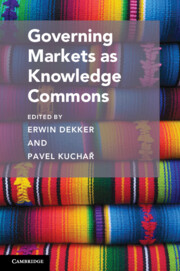Book contents
- Governing Markets as Knowledge Commons
- Cambridge Studies on Governing Knowledge Commons
- Governing Markets as Knowledge Commons
- Copyright page
- Contents
- Contributors
- Preface
- Acknowledgments
- Introduction
- 1 The Contribution Good as the Foundation of the Industrial Revolution
- 2 On the Social Evolution of Knowledge
- 3 Individual Sovereignty and Coproduction of Knowledge Governance
- 4 Common Sense Commons
- 5 Conventions as Shared Cognitive Infrastructures
- 6 Property Rights, Knowledge Commons, and Blockchain Governance
- 7 Knowledge Commons, Social Infrastructures, and Informal Markets
- 8 Entrepreneurship and Governance in the Scotch Whisky Knowledge Commons
- 9 Trolling in the Deep
- 10 Crowdfunding the Queer Museum
- 11 Understanding Different Qualities of the Knowledge Commons in Contemporary Cities
- References
7 - Knowledge Commons, Social Infrastructures, and Informal Markets
The Case of Informal Trade Credit in India
Published online by Cambridge University Press: 09 December 2021
- Governing Markets as Knowledge Commons
- Cambridge Studies on Governing Knowledge Commons
- Governing Markets as Knowledge Commons
- Copyright page
- Contents
- Contributors
- Preface
- Acknowledgments
- Introduction
- 1 The Contribution Good as the Foundation of the Industrial Revolution
- 2 On the Social Evolution of Knowledge
- 3 Individual Sovereignty and Coproduction of Knowledge Governance
- 4 Common Sense Commons
- 5 Conventions as Shared Cognitive Infrastructures
- 6 Property Rights, Knowledge Commons, and Blockchain Governance
- 7 Knowledge Commons, Social Infrastructures, and Informal Markets
- 8 Entrepreneurship and Governance in the Scotch Whisky Knowledge Commons
- 9 Trolling in the Deep
- 10 Crowdfunding the Queer Museum
- 11 Understanding Different Qualities of the Knowledge Commons in Contemporary Cities
- References
Summary
The paper examines centuries old informal footwear cluster in India, and describes the instrument of informal trade credit, ingeniously designed and sustained by the market participants. A peculiar feature of this instrument is the shared knowledge of the creditworthiness of the traders. This knowledge is produced and consumed by the market participants as a useful resource in estimating discount on the credit. Using Ostrom’s IAD framework (its modified version) the paper attempts to understand the governance of knowledge commons in the market. In order to do so, it identifies the socio-cultural infrastructure which enables such governance. In helping identify the theoretical link between informal markets and knowledge commons through this case, the paper advances a promising step for future research not only in knowledge commons structures, but also in informal markets around the world.
- Type
- Chapter
- Information
- Governing Markets as Knowledge Commons , pp. 176 - 194Publisher: Cambridge University PressPrint publication year: 2021

